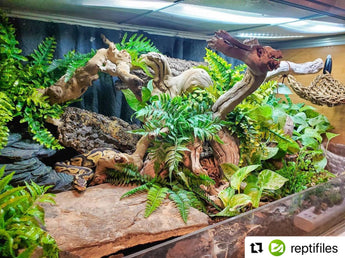Creating the perfect habitat for your ball python goes beyond just providing the right temperature and humidity levels; it’s also about choosing the right decor. As a proud ball python owner, I’ve learned that a well-decorated enclosure not only looks appealing but also provides enrichment for your snake, making it feel secure and happy. In this comprehensive guide, we’ll explore everything from essential decor items to advanced setups, ensuring your ball python thrives in a beautiful environment.
Understanding Ball Python Needs
Before diving into decor options, it’s essential to understand the needs of your ball python.
Natural Habitat
In the wild, ball pythons are found in a variety of habitats, including grasslands, savannas, and forests. They prefer areas with hiding spots and ambush points to hunt and escape predators. Replicating this environment in your enclosure is crucial.
Key Requirements for Your Ball Python
- Temperature: Maintain a gradient between 75°F and 95°F.
- Humidity: Aim for humidity levels between 40% and 60%.
- Space: Provide a minimum enclosure size of 40 gallons for adult ball pythons.

Essential Decor Items for Your Ball Python Habitat
Let’s explore essential decor items that will improve your ball python’s quality of life.

1. Hides
Providing hiding spots is crucial. Ball pythons are known for their shy nature and prefer to feel secure.
Types of Hides
| Type | Material | Pros | Cons |
|---|---|---|---|
| Caves | Resin, Plastic | Durable, Easy to Clean | Can Retain Heat |
| Logs | Wood, Cork | Natural Look, Holds Humidity | May Rot |
| Tunels | Plastic | Affordable, Easy to Position | Less Aesthetic Appeal |

2. Substrate
The substrate you choose can enhance your habitat’s aesthetics while also providing a comfortable environment for your ball python.
Popular Substrate Options
- Aspen Bedding: Great for burrowing and easy to spot clean.
- Reptile Carpet: Washable and durable, but harder for burrowing.
- Coconut Fiber: Eco-friendly and great for humidity retention.

3. Water Bowl
Water bowls should be large enough for your ball python to soak in. Choose a heavy bowl to prevent tipping.
4. Climbing Structures
Although ball pythons are not primarily arboreal, they enjoy climbing. Adding branches or platforms can enhance their enclosure.

Best Climbing Options
- Natural Driftwood: A beautiful addition but ensure it’s treated for safety.
- Artificial Vines: Lightweight and easy to arrange.
Advanced Decor Ideas for Ball Python Enclosures

Once you’ve established the basics, consider some advanced decor ideas to enrich your ball python’s habitat.
1. Live Plants
Live plants can improve humidity and provide natural hiding spots. Make sure to choose non-toxic plants.

Recommended Live Plants
- Pothos: Hardy and grows well in low light.
- Spider Plant: Great for beginners and resilient.
- Fern: Adds greenery and humidity.
2. Backgrounds
A visually appealing background can make your enclosure look more natural. You can use removable backgrounds, like 3D rock or forest scenes.
3. Enrichment Toys
Interactive toys can keep your ball python mentally stimulated. Look for snake-safe options like puzzle feeders.
Comparison of Enclosure Decor Options
In this section, we’ll compare various decor options based on aesthetics, maintenance, and cost.
| Decor Item | Aesthetics | Maintenance | Cost |
|---|---|---|---|
| Hides | 🌟🌟🌟🌟 | 🌟🌟 | Low |
| Substrates | 🌟🌟🌟 | 🌟🌟🌟 | Low |
| Live Plants | 🌟🌟🌟🌟🌟 | 🌟🌟🌟🌟 | Medium |
| Climbing Structures | 🌟🌟🌟🌟 | 🌟🌟 | Medium |
Creating a Balanced Environment
One of the most vital aspects of keeping a ball python is creating a balanced environment. Here are some tips for achieving this:
Maintaining Temperature and Humidity
Use heat mats or ceramic heat emitters to maintain the right temperature gradient. A hygrometer will help monitor humidity levels effectively.
Regular Cleaning Routine
Establish a cleaning schedule to maintain hygiene in the enclosure. Regularly replace the substrate and clean decor items.
Cleaning Checklist
- Remove waste and uneaten food.
- Spot clean substrate weekly.
- Deep clean every month.
Pros and Cons of Various Decor Items
Understanding the advantages and disadvantages of different decor options will help you make informed choices.
Hides
- Pros: Provide security, reduce stress.
- Cons: Can be difficult to clean if poorly designed.
Substrates
- Pros: Aesthetic variety, natural behavior encouragement.
- Cons: Some require more maintenance than others.
Live Plants
- Pros: Naturalistic look, humidity control.
- Cons: Requires care and may need replacement.
Common FAQs about Ball Python Decor
What type of decor is best for ball pythons?
Ball pythons thrive with a mix of hides, climbing structures, and natural decor. It’s essential to provide secure hiding spots and enrich their environment.
Are there any toxic plants for ball pythons?
Yes, plants like pothos and spider plants are safe, whereas others like oleander and foxglove are toxic. Always research plants before adding them to the enclosure.
How often should I change the substrate?
Spot clean daily and change the substrate entirely every 4-6 weeks, or more frequently if it becomes soiled.
Can I use rocks in my ball python’s habitat?
Yes, but ensure they are clean and free of sharp edges. Use them judiciously to enhance the aesthetic without posing a risk to your snake.
What is the ideal size for a ball python hide?
The hide should snugly fit your ball python, allowing it to feel secure. A hide that’s too large won’t provide the same sense of safety.
Conclusion: Crafting the Perfect Habitat
Creating a stunning and functional habitat for your ball python is not only about aesthetics but also about enhancing your snake’s well-being. By combining hides, climbing structures, and natural elements, you can create an environment that facilitates natural behaviors while also being visually appealing. Your ball python deserves the best, and investing time into its habitat will lead to a happier, healthier pet.
Remember, every snake is unique, so observe their behaviors and adapt the decor according to their needs. Happy decorating!